In this article:
In today’s beauty industry, there is a great demand for products that help to lighten the skin. The market is flooded with skin-whitening and skin-bleaching products that promise to give consumers a lighter complexion.
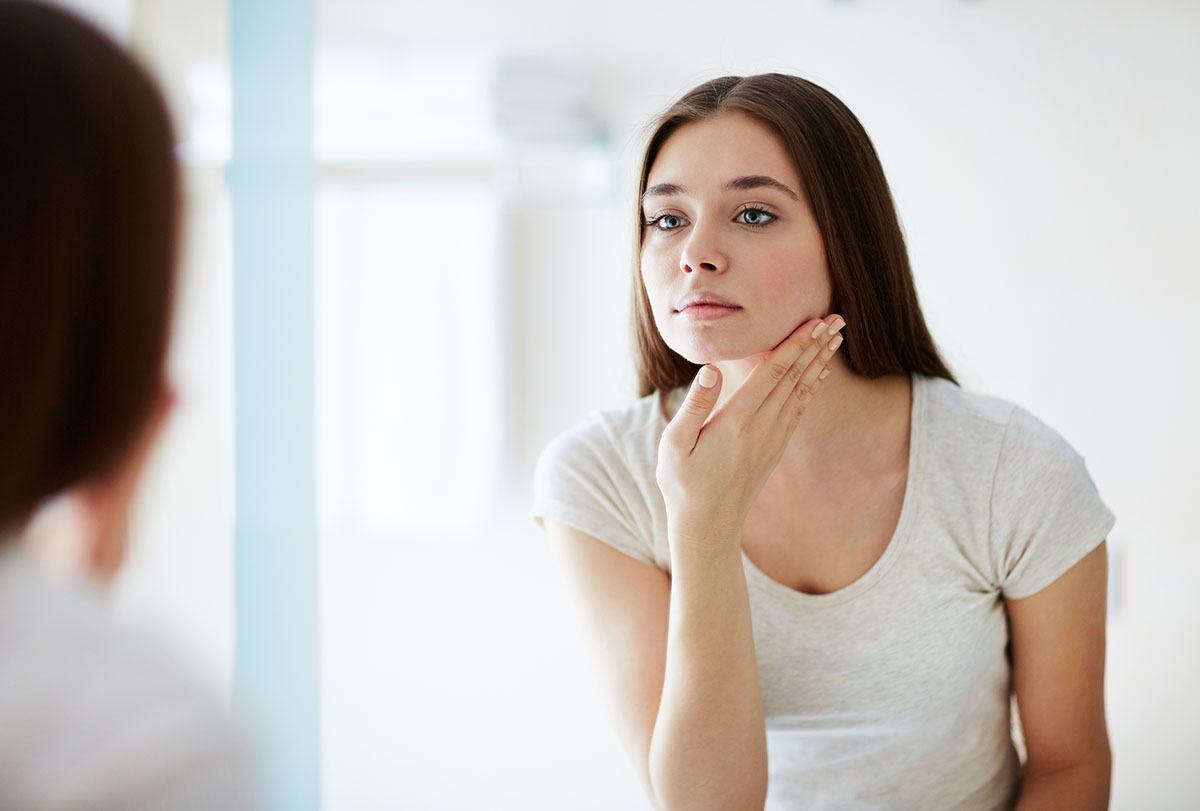
However, there is often confusion between these two terms. While they are often used interchangeably, there is a distinct difference between skin whitening and skin bleaching. (1)
This article will explore the difference between these two terms and also discuss the potential risks and benefits of using skin-whitening and skin-bleaching products.
Skin Whitening Versus Skin Bleaching: What’s the Difference?
Here are some key differences between skin whitening and skin bleaching procedures.
Skin whitening
Skin whitening is the process of using natural or chemical substances to achieve a more even skin tone and reduce hyperpigmentation by reducing the melanin content in the skin. Melanin is the pigment that gives skin its color, and the more melanin a person has, the darker their skin will be.
Skin-whitening products work by inhibiting the production of melanin, leading to a lighter complexion using mainly natural compounds.
Natural skin-whitening products such as kojic acid, arbutin, glycolic acid, niacinamide, and licorice extract have been shown to effectively reduce melanin production and improve skin tone. These compounds are often preferred by consumers seeking a more natural approach to skin whitening. (1)(2)(3)(4)(5)
Note: The efficacy and safety of natural skin-whitening compounds may vary depending on the concentration, formulation, and individual skin type.
Skin bleaching
Skin bleaching is the process of using harsh chemicals to reduce the melanin concentration in the upper layers of the skin. These processes can be dangerous and can cause skin irritation, burns, and even permanent scarring.
Additionally, harsh compounds such as hydroquinone and mercury are still widely used for skin bleaching in some regions despite being banned in others due to their potential harmful effects. (1)(2)(3)(4)(5)
Skin Whitening Versus Skin Bleaching: What Products Are Used?
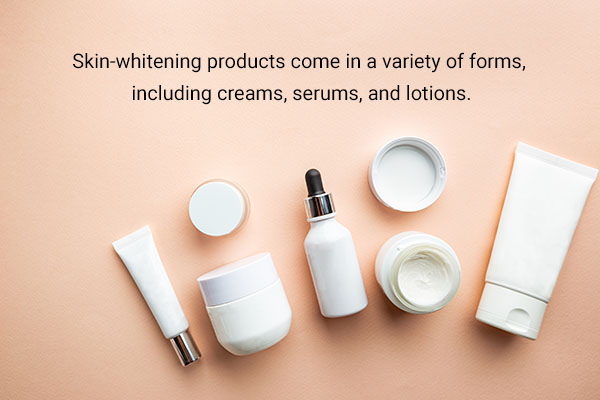
Skin-whitening products
Skin-whitening products come in a variety of forms, including creams, serums, and lotions. These products typically contain natural ingredients such as bacterial extracts, arbutin, and vitamin C, which have been shown to inhibit the production of melanin.
Skin-whitening or skin-lightening products have both advantages and disadvantages.
As demonstrated by research on vitamin C and arbutin as skin depigmenting agents, the use of vitamin C has been found to have many benefits in reducing melanin pigmentation and achieving a more even skin tone.
It has been shown to have antioxidant properties, helping to protect the skin against damage caused by free radicals, and to improve collagen synthesis, leading to a healthier and more youthful appearance.
It is important to note that while these products can be effective in lightening the skin, they should be used with caution. Overuse of skin-whitening products can lead to skin irritation, dryness, and even hyperpigmentation. (4)(5)(6)(7)
Skin-bleaching products
Skin-bleaching products, also known as skin lighteners, contain harsh chemicals such as hydroquinone, mercury, and corticosteroids to lighten the skin beyond the natural skin tone. These products work by inhibiting the production of melanin and removing the top layer of the skin. (1)(2)(3)
Hydroquinone is a chemical used for skin lightening, but it can be very dangerous if used without proper supervision from a dermatologist. It can cause several problems such as a burning sensation in the skin, fish odor syndrome, and even fetal growth retardation if used in high concentrations for a long time.
Topical steroids are also linked with adverse effects such as acne, poor wound healing, and even adrenal suppression.
Another ingredient commonly used in skin-whitening products is mercury, which can cause various complications such as gastrointestinal upset, visual and auditory disturbances, and nephrotoxicity.
The use of mercury in cosmetics is regulated globally, but it can still be present in products in countries where it is not banned. It is important to be aware of the potential risks of these ingredients and to always consult a medical professional before using them. (1)(2)(8)
Skin Whitening Versus Skin Bleaching: Which Is Better?
Skin whitening and skin bleaching are cosmetic treatments that aim to reduce the appearance of dark spots, blemishes, and uneven skin tone.
Skin whitening is typically achieved through the use of more natural topical products containing ingredients such as kojic acid, vitamin C, and arbutin, making them a better choice.
On the other hand, skin bleaching involves the use of harsh chemicals, such as hydroquinone, to get lighter skin than the natural skin tone, which can cause damage to the skin in the long run.
So, solely based on the ingredients used, skin whitening with natural compounds may offer a safer and more sustainable option than skin bleaching. However, it is important to get both these treatments done under medical supervision. (4)(7)
Risks of Skin Whitening and Skin Bleaching
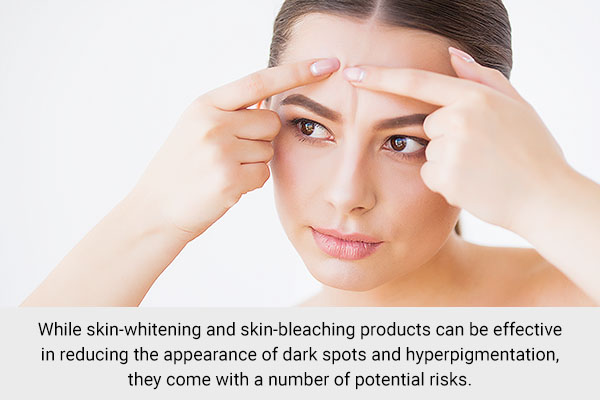
While skin-whitening and skin-bleaching products can be effective in reducing the appearance of dark spots and hyperpigmentation, they come with a number of potential risks.
Skin-whitening products that contain natural ingredients are generally considered safe, but they should still be used with caution. Overuse of these products can lead to skin irritation, dryness, and even hyperpigmentation.
Skin-bleaching products, on the other hand, are associated with some serious health risks. These products can cause skin irritation, burns, and permanent scarring. They can also contain harmful chemicals such as hydroquinone and mercury, which can lead to mercury poisoning and other health problems.
In addition to the potential risks, ethical concerns surround skin-whitening and skin-bleaching products. These products are often marketed toward people with darker skin tones, perpetuating the idea that lighter skin is more desirable. (1)(9)
Natural Agents for Skin Whitening and Bleaching
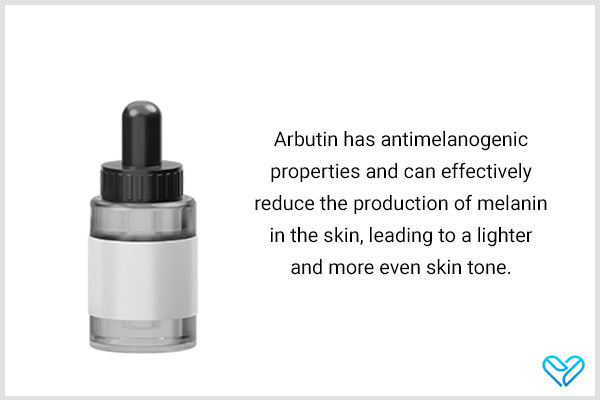
Skin bleaching and whitening may be achieved through the use of natural ingredients. Some of these ingredients can be effective, such as arbutin, which has been found to be a safe alternative to other skin-depigmenting agents.
Arbutin has antimelanogenic properties and can effectively reduce the production of melanin in the skin, leading to a lighter and more even skin tone. (7)
Are There Safer Ways That Can Be Tried at Home
Yes, you can try certain ingredients at home that act as natural whitening agents. Here are some DIY recipes.
1. Lemon juice and honey
Research has shown that lemon extract is often used in commercial products for its skin-bleaching properties. (10) So, you may be able to employ it as a DIY whitening agent.
Simply mix 1 tbsp of lemon juice with ½ tbsp of honey, and apply the mixture to your face as a toner. Wash it off after 10–15 minutes.
2. Milk and honey
Mix 1 tsp of honey in 1 tbsp of raw milk, and spread the mixture on your face using a cotton ball. Leave it on for 15–30 minutes, and then wash it off. Doing this once a day is good enough as milk has skin-whitening properties. (11)
This recipe has been recorded as a commonly employed recipe for skin whitening. (12)
3. Yogurt and turmeric
Some experts recommend the use of yogurt for skin whitening, and research has shown the effectiveness of curcumin, found in turmeric, in decreasing the skin’s melanin content, leading to its whitening action. (13)
Take 1 tbsp of yogurt and add a pinch of turmeric to it. Apply the paste to your skin, and leave it on for 15–30 minutes before washing it off. Do this every day.
Similarities Between Skin Whitening and Skin Bleaching
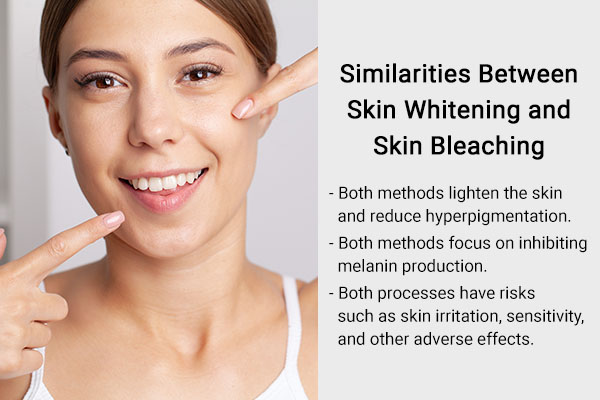
Skin whitening and skin bleaching share some similarities, such as:
- Both methods lighten the skin and reduce hyperpigmentation.
- Both methods focus on inhibiting melanin production.
- Both processes have risks such as skin irritation, sensitivity, and other adverse effects.
Final Word
Skin whitening and skin bleaching are often used interchangeably, but they are two different practices. Both practices have their pros and cons, and it is important to prioritize skin health and safety over societal beauty standards.
It is essential to consult with a dermatologist before undergoing any skin-whitening or skin-bleaching treatments to ensure that the products used are safe and effective.
Ultimately, embracing one’s natural skin tone and promoting diversity and inclusivity in beauty standards are crucial for creating a more accepting and positive society.
- Was this article helpful?
- YES, THANKS!NOT REALLY


